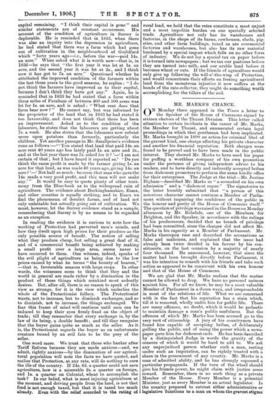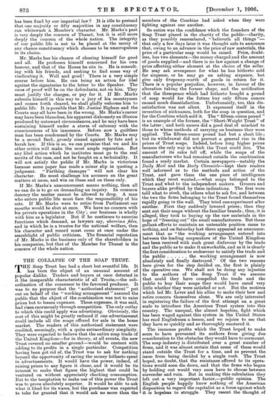MR. MARKS'S CHANCE.
(IN Monday there appeared in the Times a letter to kJ the Speaker of the House of Commons signed by sixteen electors of the Thanet Division. This letter called attention to certain incidents in the career of Mr. Marks, the Member for Thauet, and enumerated certain legal proceedings in which that gentleman had been implicated. Mr. Marks brought in 1890 an action for criminal libel, of the gravest kind, one charge affecting his private character and another his financial reputation. Both charges were found to be proved and to have been made in the public interest. They showed Mr. Marks to have used his paper for puffing a worthless company of his own promotion under the pretence of giving independent advice to his readers, and to have directly and indirectly accepted bribes from dishonest promoters to perform the same kindly office for their enterprises. The Judge at the trial—Mr. Justice Bigham—described Mr. Marks as "a scoundrel on his own admission" and a "dishonest rogue." The signatories to the letter humbly submitted that "a person of this notorious character cannot continue a Member of Parlia- ment without impairing the confidence of the public in the honour and purity of the House of Commons itself." The question of privilege was raised in the House on Monday afternoon by Mr. Ridsdale, one of the Members for Brighton, and the Speaker, in accordance with the rulings of his predecessors, decided that no breach of privilege had been committed, since the charges did not affect Mr. Marks in his capacity as a Member of Parliament. Mr. Marks thereupon rose and described the accusations as false and malicious, and explained that the issue had already been twice decided in his favour by his con- stituents, on the last occasion by a majority of nearly four thousand. He announced, however, that since the • matter had been brought directly before Parliament, it was his intention to consult with his friends and take such action as appeared to be consistent with his own honour and that of the House of Commons.
We are glad that Mr. Marks realises that the matter cannot be allowed to drop. We have no personal animus against him. For all we know, he may be a most valuable' Member of Parliament in a dozen ways, and irreproachable in most of the relations of life. What we are concerned with is the fact that his reputation has a stain which, till it is removed, wholly unfits him for public life. There are many offences, no doubt, which it would be pedantic to maintain damage a man's public usefulness. But the offences of which Mr. Marks has been accused go to the very root of citizenship. A jury of his countrymen have found him capable of accepting bribes, of deliberately gulling the public, and of using the power which a news- paper gave him for dishonest ends. He has been described by a distinguished Judge in words the gravity of the censure of which it would be hard to add to. We ask any unprejudiced person whether such a man, resting under such an imputation, can be rightly trusted with a share in the government of any country. Mr. Marks is a man of admitted ability, and he has strongly espoused a particular propaganda. If the turn of the wheel should give his friends power, he might claim with justice some reward. Remember, there is no such thing as a private Member of the House. Every Member is a potential Minister, just as every Member is an actual legislator. Is the country prepared to entrust either administrative or legislative functions to a man on whom the gravest stigma" has been fixed by our impartial law ? It is idle to pretend that one majority or fifty majorities in any constituency can whitewash a Member's character. Mr. Marks's past is very deeply the concern of Thanet, but it is still more deeply the coucern of the whole nation. The integrity. of our public life is not to be placed at the mercy of any chance constituency which chooses to be unscrupulous in its choice.
Mr. Marks has his chance of clearing himself for good and all. He professes himself concerned for his own honour, and that of the House he site in. He is consult- ing with his friends, and seeking to find some way of vindicating it. Well and good! There is a very simple course before him. He can bring an action for libel against the signatories to the letter to the Speaker. The onus of proof will be on the defendants, not on him. They must justify the charges, or pay for it. If Mr. Marks submits himself in this way to a jury of his countrymen and comes forth cleared, we shall gladly welcome him to public life. It is possible that Mr. Justice Bigham and the Courts may all have been in the wrong. Mr. Marks's career may have been blameless, his apparent dishonesty an illusion produced by untoward circumstances, and he may have been sustaining himself under a storm of calumny with the consciousness of his innocence. Before now a guiltless man has been condemned by the Courts. Mr. Marks may be a second Beck, grossly sinned against by fate and a harsh law. If this is so, we can promise that we and his other critics will make the most ample reparation. But any libel action wbich he institutes must go to the real merits of the case, and not be fought on a technicality. It will not satisfy the public if Mr Marks is victorious because some paper has made a minor slip in quoting a judgment. "Farthing damages" will not clear his character. He must challenge his accusers on the great matters at issue, and win on these and on these only.
If Mr. Marks's announcement means nothing, then all we can do is to go on demanding an inquiry. In common decency the matter cannot be allowed to drop. A man who enters public life must face the responsibility of his acts. If Mr. Marks were to retire from Parliament our mouths would be shut at once. We have no concern with his private operations in the City ; our business is wholly with him as a legislator. But if he continues to exercise functions which demand, as lawyers say, uberrima fides, and in which he is a trustee for the national welfare, then his character and record must come at once under the searchlight of public criticism. The financial reputation of Mr. Marks is the business only of the shareholders in his companies, but that of the Member for Thanet is the concern of the whole nation.































































 Previous page
Previous page